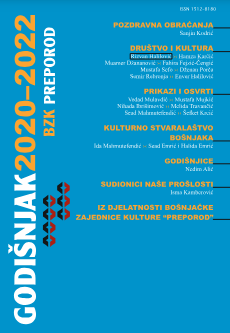O kulturi sjećanja u javnoj komunikaciji
On the culture of remembrance in public communication
Author(s): Mustafa Sefo, Dženan PorčaSubject(s): Communication studies, Transformation Period (1990 - 2010), Politics of History/Memory, Wars in Jugoslavia
Published by: Bošnjačka zajednica kulture "Preporod"
Keywords: culture of memory; genocide against Bosniaks; media; communication; public communication; public; public opinion;
Summary/Abstract: A culture of remembrance is an integral part of human existence and day-to-day life, as well as a natural human need that is rooted in psychological and social factors that make up the entire human experience. This phenomenon is interpreted and practiced in different ways in society, depending on the type of social system, current situation, and certain social and political goals, which is certainly not a good example of societal functioning. Numerous social sciences are interested in researching this phenomenon, primarily psychology, sociology, communicology, history, and anthropology. Communication, as a basic human need to share experiences and learn new things, is in fact the primary way of how we keep the culture of remembrance alive. The media play a crucial role in this process by being the agents of communication between people and presenting the news and human experiences from the social reality. The media therefore undoubtedly have a tremendous responsibility to properly interpret historical facts that are the basis of the culture of remembrance. The Athenian democracy, which is the best social system model, can contribute immensely to the development and preservation of the culture of remembrance by implementing its main postulate – keeping the public well-informed. The existence of well-informed public is defined by proper and high-quality media work, whose mission is to inform the public truthfully and objectively. Bosnia and Herzegovina, a society that suffered genocide and war of aggression, has two types of media: the ones whose work is based on truthfulness and objectivity, therefore, to some extent, enabling the preservation of the culture of remembrance in public communication; and the ones whose aim is to, unfortunately, keep alive the genocidal ideas and plans that go against the Bosniak people by using historical revisionism that prevents the existence of the culture of remembrance.
Journal: Godišnjak Bošnjačke zajednice kulture »Preporod«
- Issue Year: 2022
- Issue No: 1
- Page Range: 81-90
- Page Count: 10
- Language: Bosnian

